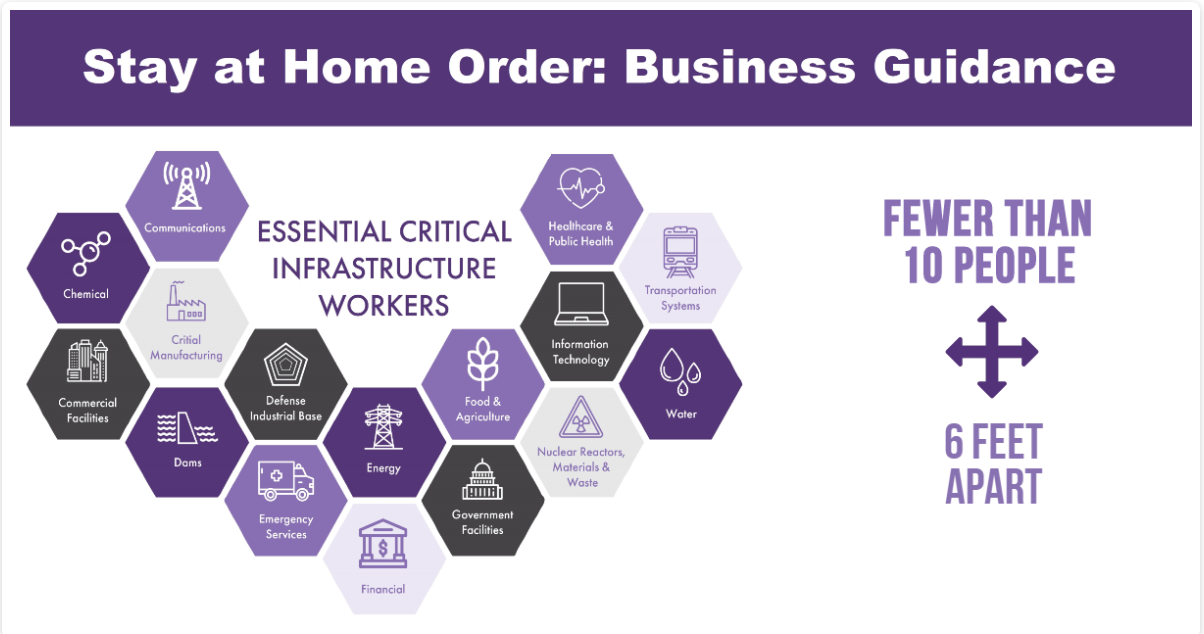Information contained in this publication is intended for informational purposes only and does not constitute legal advice or opinion, nor is it a substitute for the professional judgment of an attorney.
NOTE: Because the COVID-19 situation is dynamic, with new governmental measures each day, employers should consult with counsel for the latest developments and updated guidance on this topic.
On Friday, April 3, 2020, Governor Mike Parson directed Dr. Randall Williams, Director of the Missouri Department of Health and Senior Services, to issue a statewide “Stay Home Missouri” Order (“Order”), which is effective April 4, 2020 through April 24, 2020. It is intended to directly reduce further spread of COVD-19 in the State of Missouri. Missouri employers most impacted by the Order include businesses without “essential worker functions” and all public retailers. Importantly, even the most stringent restrictions in the Order do not require any Missouri businesses to cease operations, but rather, merely follow enhanced social distancing guidelines. In many Missouri counties, the guidelines from local authorities will provide more restrictive requirements that must be followed.
Along with the Order, Governor Parson’s office issued its own Guidance and Frequently Asked Questions on the Order. Pursuant to that Guidance, the Missouri Department of Economic Development provided this chart to summarize the “essential critical infrastructure workers” and the “social distancing” requirements:

Key Provisions for Missouri Employers
1. Social Distancing Restrictions
Governor Parson previously issued a statewide “social distancing” order on March 21, 2020. This prior order was addressed in Littler’s ASAP: State and Local COVID-19 Orders Affecting the St. Louis Region – What Does This Mean for Employers?
The new Stay Home Missouri Order reiterates these social distancing restrictions, including instructing Missouri residents to:
- Avoid social gatherings of 10 or more people in a single space;
- Use social distancing of 6 feet between individuals, including when customers are standing in line or individuals are using shared indoor or outdoor spaces when outside of their residences;
- Avoid eating/drinking at restaurants/bars other than drive-thru, pickup, or delivery;
- Practice good hygiene; and
- Where feasible, work from home.
The Order contains broader restrictions than the previous order, however, and specifically instructs Missouri residents to avoid leaving their homes or places of residence, other than to perform necessary work, to access food, prescriptions, health care or other necessities, or to engage in outdoor activity. If residents leave their homes for any of these reasons, they are to comply with the limitations on social gatherings and social distancing.
Restaurants/Bars. On March 23, 2020, Governor Parson signed Executive Order 20-05 ordering the suspension of any prohibition on the sale of unprepared food by restaurants to the public. This step was intended to further support restaurants and bars as many of them transitioned to drive-thru, pickup, or delivery services only. Yet, the Guidance and FAQs issued with the Order explicitly state that restaurants may continue to provide dine-in services, provided there are 10 or fewer people within the restaurant for dining services and the 6-feet social distancing requirement is observed. For these purposes, the 10-person limitation includes employees and customers.
All Missouri employers should endeavor to ensure their workers and workplaces comply with these social distancing restrictions.
2. Essential Worker Functions Defined
The Order provides for specific restrictions based upon whether an entity employs individuals with “essential worker functions” as defined by the U.S. Department of Homeland Security, Cybersecurity & Infrastructure Security Agency (“CISA”). CISA notes that it intends its list to be overly inclusive and should be interpreted to allow for COVID-19 responses by critical infrastructure sectors, workers, and functions. Additional detail regarding the specific qualifying workers of the below essential sectors can be found in the CISA Guidance.
An entity employs an individual with “essential worker functions” if those workers are employed in following sectors:
- Healthcare/Public Health;
- Law Enforcement, Public Safety, and Other First Responders;
- Food and Agriculture;
- Energy (CISA includes specific provisions for the electricity industry, petroleum industry, and operations involving natural gas and other liquid fuels.);
- Waste and Wastewater;
- Transportation and Logistics;
- Public Works and Infrastructure Support Services;
- Communications and Information Technology;
- Other Community or Government Based Operations and Essential Functions;
- Hazardous Materials;
- Financial Services;
- Chemical;
- Defense Industrial Base;
- Commercial Facilities;
- Residential/Shelter Facilities and Services; and
- Hygiene Products and Services.
3. Essential Businesses: Businesses With Essential Worker Functions
For essential businesses, the only restrictions provided in the Order, other than the general social gathering and social distancing restrictions, are limited to businesses engaged in retail sales to the public. These restrictions focus on occupancy limits for retailers.
Public Retailers. Public retailers must limit the number of individuals in any retail location as follows:
- For smaller locations (less than 10,000 sq. ft.), the limit is 25% or less of the authorized occupancy; and
- For larger locations (10,000 sq. ft. or more), the limit is 10% or less of the authorized occupancy.
Employees and vendors are not included in the calculation toward this occupancy limit. These limits are based upon the local fire or building code occupancy limits. If a business is not subject to a local fire or building code, a business can calculate the limit using the following formula:
- For smaller locations: (Building Sq. Ft. ÷ 30) x 0.25 = Occupancy Limit; and
- For larger locations: (Building Sq. Ft. ÷ 30) x 0.10 = Occupancy Limit.
Grocery Stores. The Guidance and FAQs confirm that grocery stores are considered public, essential retailers. Further, they are “strongly encouraged to set aside hours, outside of regular store hours, to allow third-party grocery delivery services to provide grocery shopping services for their customers,” so as to “allow individual shoppers to shop during regular store hours, and reduce congestion during such times.” The Guidance and FAQs stress that this approach will “allow such services to function in an environment where their services” are in high demand.
Childcare Providers. The Guidance and FAQs confirm that “[d]aycares, child care providers, or schools providing child care for working families can continue” to operate in accordance with the CDC Guidelines.
4. Non-Essential Businesses: Businesses Without Essential Worker Functions
For businesses without essential worker functions, the Order specifically provides that these businesses must comply with the social gathering and social distancing requirements set forth above. For individuals performing essential worker functions, the social distancing requirement does not apply where job duties require contact with other people closer than six feet.
Non-essential businesses may request a waiver on the 10-person social gathering limitation from the Director of Economic Development on its specified form by explaining why the business is essential to public health and safety. Before requesting a waiver, businesses are encouraged to consult with CISA Guidelines regarding essential businesses.
Missouri Local Stay At Home Orders
Missouri businesses should also stay apprised of all orders issued by their local officials as the Order provides that local health authorities may enforce more restrictive public health requirements for businesses or individuals. Stay at home orders previously issued by St. Louis County and the City of St. Louis generally provide stricter requirements than those in the new statewide Order. For more information on those orders, see Littler’s ASAP: State and Local COVID-19 Orders Affecting the St. Louis Region – What Does This Mean for Employers? Employers should also be aware that stay at home orders are in place in the wider Kansas City metro area. A list of all local stay at home orders implemented in the State of Missouri can be found here.
Missouri State Resources for Businesses
Governor Parson’s office also issued Frequently Asked Questions in the Workplace, which addresses potential workplace questions on health, management, leave, facilities, and school, child or adult daycare facilities, as well as nursing facility closings.
The U.S. Small Business Administration is offering Missouri-designated Economic Injury Disaster Loans to small businesses and private, non-profit organizations to assist with the economic injury caused by COVID-19, found here.
In the St. Louis area, the St. Louis Economic Development Partnership and St. Louis Development Corporation is offering zero percent interest loans for small businesses through the Small Business Resource Fund, found here. Additional resources available to businesses in the St. Louis area can be found on the St. Louis Regional Chamber of Commerce site.
In the Kansas City area, the Economic Development Corporation of Kansas City is continuing to provide loans to small businesses located in Kansas City, Missouri. More information on eligibility criteria and how to apply can be found here. Additional resources available to businesses in the Kansas City area can be found on the City of Kansas City site.
Finally, for additional comprehensive, up-to-date guidance on all employment-related facets of COVID-19, visit our dedicated page: Littler COVID-19 Resources for Employers.





